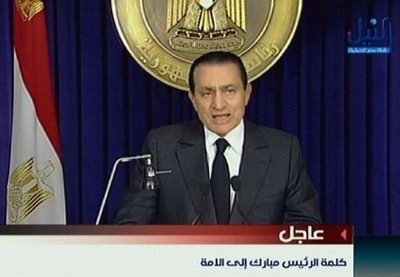|
|
Mubarak's Friends, Options Dwindled February 11, 2011
President Hosni Mubarak found during the nearly three weeks of protests against his autocratic rule that his friends at the top of the world's governing ladder grew fewer and fewer. He had promised support from Saudi Arabia's ruler, King Abdullah, as late as February 9, but that in the end wasn't enough. Other world leaders, among them the leaders of western Europe countries, said similar things.
Now that he has fulfilled the first two requests, Mubarak must be aware of what is happening elsewhere in the world. Palestinians are shouting in the streets, not in anger but in joy, hoping that they might soon enjoy similar success. Mubarak faces a grim future on the world stage, especially in the financial realm, in the wake of an announcement by Swiss bankers that they were freezing his assets. He is holed up in a presidential palace on the Red Sea, far from Cairo. He might be able to ride out the resulting storm, but his days of influencing the political climate are now entirely over. Mubarak's downfall came in the wake of other uprisings across northern Africa. South Sudan, an entirely new country, will appear soon, after its people voted themselves a secession from Sudan. Tunisia now has a more representative government, after large protests forced the ruler to flea. The picture in the Middle East, whose countries have, in many cases, government structures similar to Egypt's, is murky. Religious divisions have created two distinct political classes in Bahrain, and many in that country are planning political marches next week. Jordan's King Abdullah has shuffled the government and announced that he will not seek re-election. Bahrain's King Hamad bin Isa Al Khalifa has given every family in his country a payout. Even in Saudia Arabia, home to a very autocratic family dynasty of rulers, a large group of people are looking into forming a political party. Other countries are listening as well. Syria has restored access to Facebook and Twitter. Middle East watchers have their eyes on Iran. Mubarak fled 32 years to the day after the people of Iran overthrew their Shah. |
Social Studies
|

 Mubarak, whom one newspaper had asserted had personal wealth numbering in the tens of billions of dollars, finally got the message that what the people really wanted was him out — of the presidential palace, of the government, and maybe even out of the country.
Mubarak, whom one newspaper had asserted had personal wealth numbering in the tens of billions of dollars, finally got the message that what the people really wanted was him out — of the presidential palace, of the government, and maybe even out of the country.
